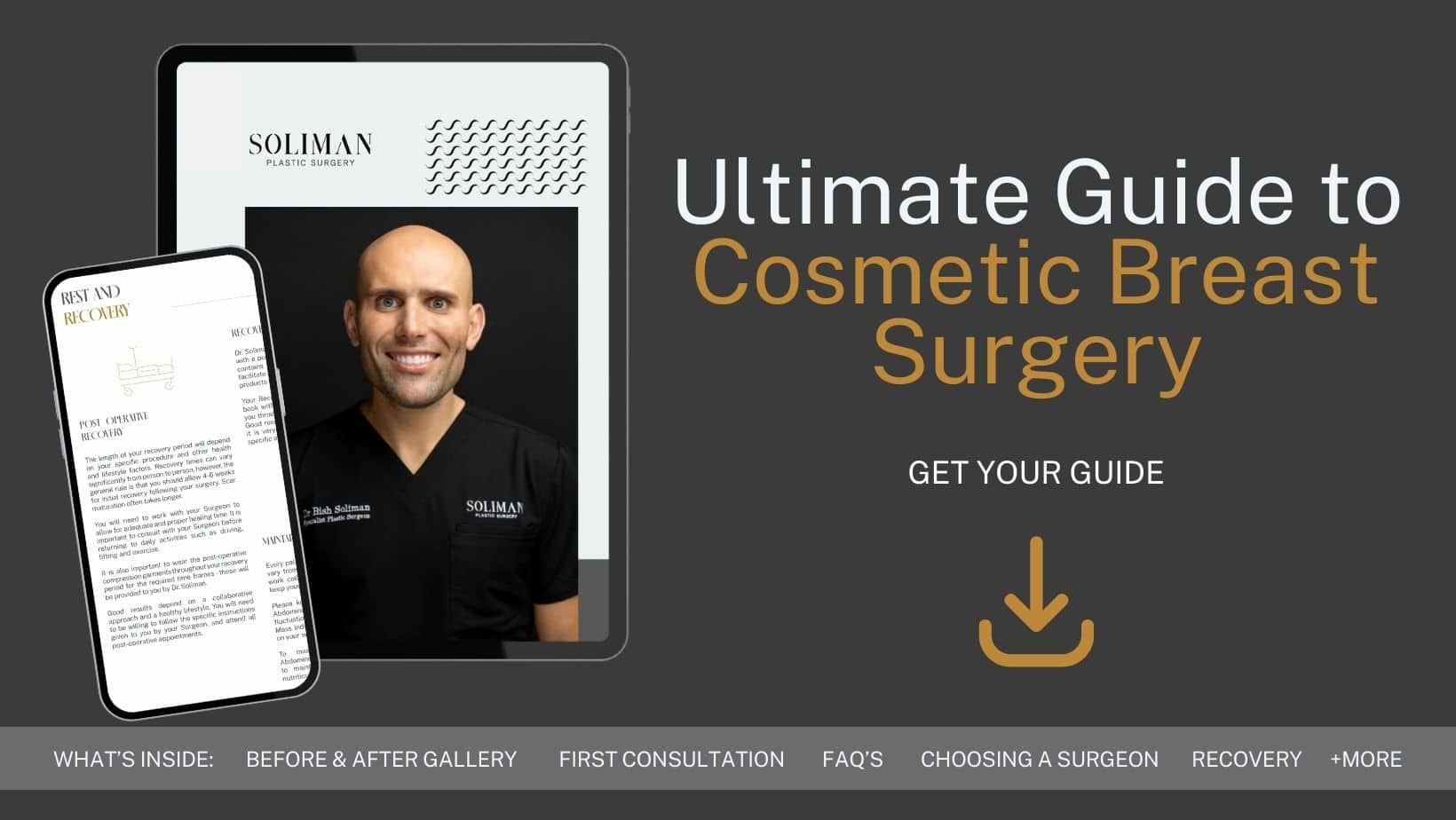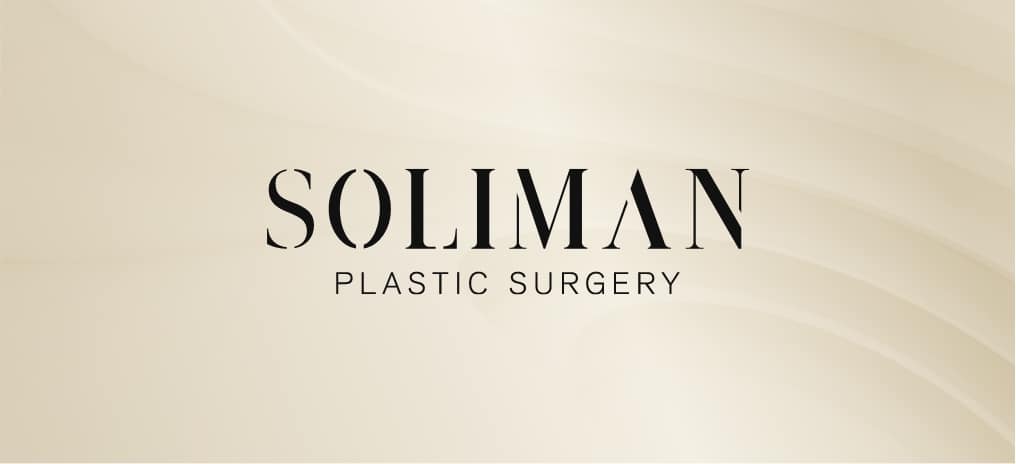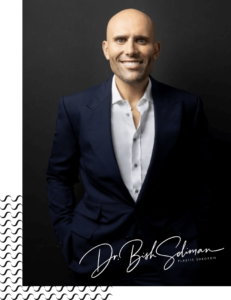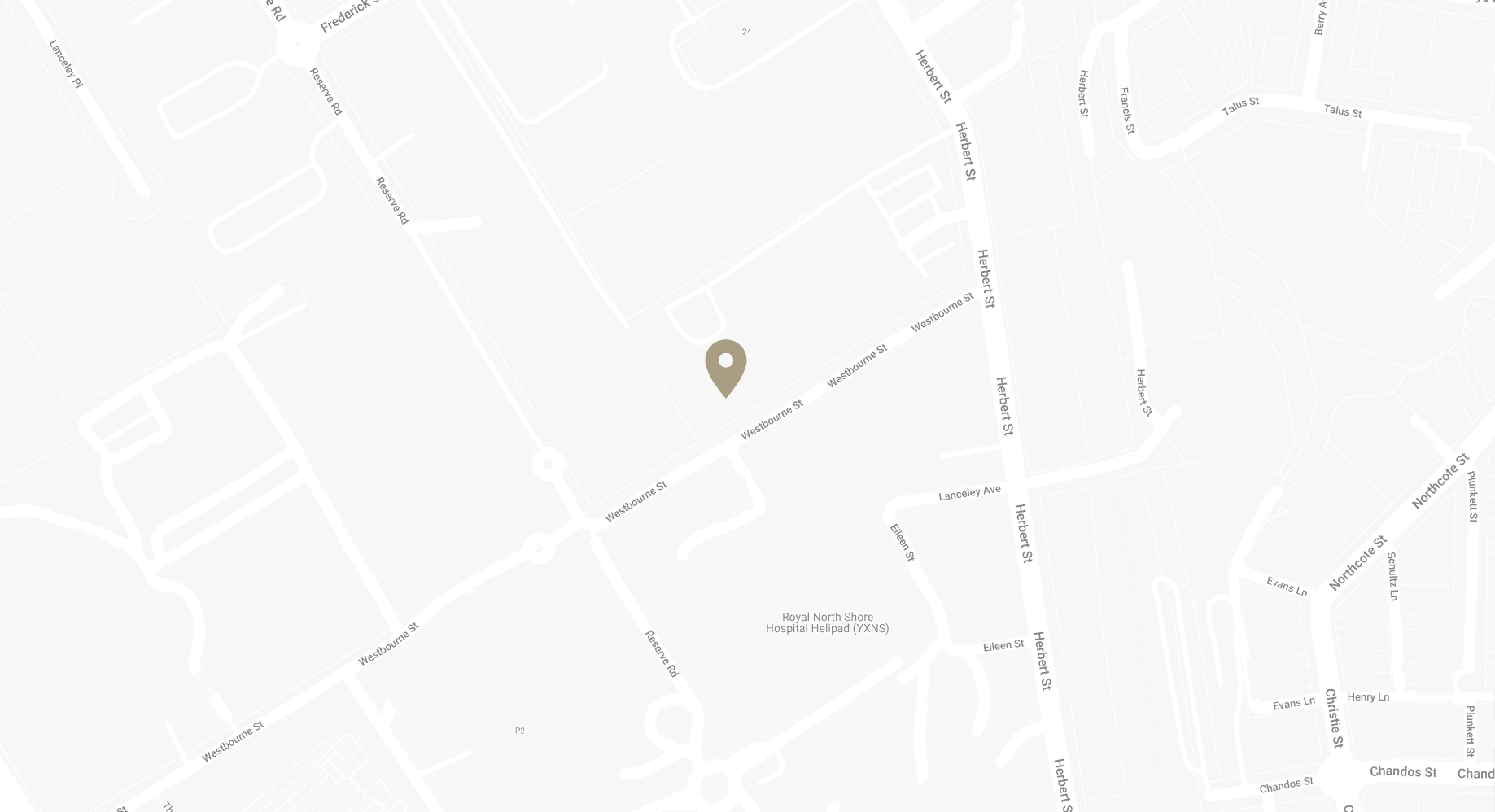Causes and Solutions for Ruptured Breast Implants
Breast implants have become a popular choice for individuals seeking to increase the size of their breasts. However, like any medical procedure, they come with their own set of risks and potential complications. Are my Breast Implants Ruptured? is one such concern that patients have.
In this blog, Sydney Specialist Plastic Surgeon Dr Bish Soliman will discuss the various aspects of breast implant ruptures, aiming to provide valuable insights and practical advice for those who might be facing this issue.
Download Dr Bish Soliman Cosmetic Breast Surgery Guide

What Causes Breast Implant Ruptures?
Breast implant ruptures can occur due to a variety of reasons, ranging from external forces to the natural ageing of the implant material. Here are some causes of implant rupture:
- Physical Impact: Trauma to the chest area, such as during a car accident, sports injury, or even a fall, can cause the implant to rupture. The impact can create a tear or hole in the implant shell.
- Surgical Errors: Improper surgical techniques during the implantation or subsequent surgeries can weaken the implant shell, making it more susceptible to rupturing.
- Implant Ageing: Over time, the materials used in breast implants can degrade. This natural ageing process can lead to a weakening of the implant shell, increasing the likelihood of a rupture.
- Capsular Contracture: This is a condition where the scar tissue that naturally forms around the implant tightens and squeezes the implant. This excessive pressure can sometimes lead to a rupture.
- Overfilling or Underfilling of Saline Implants: In the case of saline implants, not filling them to the recommended volume can cause folding and weakening of the implant shell, while overfilling can put excessive pressure on it.
- Compression during a Mammogram: While rare, excessive compression during a mammogram can cause an implant to rupture, especially if the implant is already weakened due to other factors.
Symptoms of Breast Implant Rupture
Breast implant ruptures can present a range of symptoms, and in some cases, they may not be immediately noticeable.
- Change in Breast Shape or Size: One of the most noticeable symptoms of a rupture is a change in the shape or size of the breast. This can be a gradual or sudden change, depending on the type of implant and the nature of the rupture.
- Pain and Tenderness: While some ruptures are painless, others can cause discomfort, pain, or tenderness in the breast area. This pain might be constant or intermittent.
- Swelling or Hardening: Swelling can occur as the body reacts to the rupture. In some cases, the breast might also feel firmer than usual due to the formation of scar tissue.
- Lumps or Irregularities: You might feel lumps around the implant or in the armpit area. These can be caused by silicone from a ruptured implant spreading into surrounding tissues.
- Capsular Contracture: A rupture can exacerbate capsular contracture, leading to a tight, hard breast with possible pain and distortion.
- Asymmetry: If only one implant is affected, it can lead to noticeable asymmetry between the two breasts.
- Deflation (for Saline Implants): Saline implant ruptures are often easier to detect as the saline solution leaks out quickly, leading to rapid deflation of the implant.
- Silent Rupture (for Silicone Implants): Silicone implant ruptures can be ‘silent’, meaning they present no symptoms. This is why regular monitoring through imaging tests is recommended.
- Skin Changes: Changes in the skin over the breast, such as redness or dimpling, can also indicate a rupture.
- Sensation Changes: Some women report changes in nipple sensation, either increased sensitivity or numbness.
It’s important to mention that these symptoms can also be caused by other conditions, so a professional evaluation is always necessary to confirm a rupture.
What to Do If You Suspect a Rupture?
If you suspect that your breast implant has ruptured, it’s important to take a series of steps to confirm the issue and seek appropriate treatment.
- Don’t Panic: First and foremost, try to stay calm. Breast implant ruptures, while concerning, are not usually life-threatening. However, they do require prompt attention.
- Self-Examination: Regularly examine your breasts for any of the symptoms mentioned above. If you notice any changes, don’t delay in seeking professional advice.
- Consult Your Surgeon or Healthcare Provider: Make an appointment with your plastic surgeon or healthcare provider. They can assess your symptoms and advise you on the next steps.
- Prepare for Your Appointment: Before your appointment, make a note of any symptoms, when they started, and any other changes you’ve noticed. Also, remember to bring any relevant medical records, such as details of your original breast augmentation surgery.
- Undergo Diagnostic Tests: Your doctor may recommend imaging tests such as a mammogram, ultrasound, or MRI to assess the condition of your implants and confirm a rupture.
- Discuss Treatment Options: If a rupture is confirmed, discuss the available treatment options with your doctor. These may include removal of the implant, replacement with a new implant, or other procedures.
- Consider the Timing of Surgery: Depending on your situation, immediate surgery may not be necessary. However, it’s important to plan the surgery at a time that’s safe and convenient for you.
- Understand the Risks and Benefits: Every surgical procedure has risks and benefits. Make sure you understand these fully before making a decision.
- Plan for Recovery: If surgery is required, plan for your recovery. This includes arranging time off work, help at home, and understanding the post-operative care instructions.
- Follow-Up Care: After treatment, regular follow-up appointments are important to monitor your recovery and the condition of any new implants.
How Is a Breast Implant Rupture Diagnosed?
Diagnosing a breast implant rupture is crucial for determining the appropriate course of action. The process involves several steps and diagnostic tools:
- Initial Consultation: The first step is a thorough consultation with your healthcare provider. During this session, you’ll discuss your symptoms, medical history, and any concerns you have about your implants.
- Physical Examination: Your doctor will conduct a physical examination of your breasts. They will look for signs of rupture, such as changes in breast shape, size, and symmetry, as well as any lumps, swelling, or tenderness.
- Mammography: A mammogram can be useful, especially for detecting ruptures in saline implants. However, it’s less effective for silicone implants and can sometimes miss a rupture.
- Ultrasound: An ultrasound is a non-invasive test that uses sound waves to create images of the inside of your breasts. It’s particularly useful for detecting silicone implant ruptures and can identify free silicone in the breast tissue.
- Magnetic Resonance Imaging (MRI): MRI is considered the gold standard for diagnosing silicone implant ruptures. It provides detailed images of the implant and surrounding tissues. The FDA recommends an MRI three years after implantation and every two years thereafter for silicone implants.
- Interpreting Results: Once these tests are completed, your doctor will interpret the results to confirm whether a rupture has occurred. In some cases, multiple tests may be needed to get a clear diagnosis.
- Consultation for Next Steps: If a rupture is confirmed, your plastic surgeon will discuss the next steps, including treatment options and the urgency of the situation.
- Regular Monitoring: For those with silicone implants and no symptoms, regular monitoring through MRI is recommended to detect silent ruptures.
- Patient Education: Throughout the diagnostic process, it’s important for patients to be educated about the risks, benefits, and limitations of each diagnostic tool.
Complications Associated with Breast Implant Rupture
While breast implant ruptures are not life-threatening, they can lead to several complications if not addressed in a timely manner:
- Capsular Contracture: This is one of the most common complications. The scar tissue that forms around the implant can tighten and harden, causing discomfort and distorting the shape of the breast.
- Silicone Spread: In the case of silicone implants, a rupture can cause silicone to spread into the breast tissue and even to other parts of the body. This can lead to lumps known as silicone granulomas.
- Infection: Though rare, a rupture can increase the risk of infection. Symptoms of an infection include fever, redness, swelling, and pain.
- Changes in Breast Sensation: Some women experience changes in nipple sensation, either increased sensitivity or numbness, after a rupture.
- Aesthetic Changes: Ruptures can lead to undesirable changes in the appearance of the breasts, such as asymmetry, dimpling, or wrinkling of the skin.
- Breast Pain: Pain, tenderness, or discomfort in the breast can be a complication of a rupture, especially if associated with capsular contracture.
- Emotional and Psychological Impact: The stress and anxiety associated with a ruptured implant, along with changes in physical appearance, can have significant emotional and psychological effects.
- Need for Additional Surgery: Often, a rupture will necessitate additional surgery to remove or replace the implant, which carries its own risks and recovery time.
- Rare Complications: In very rare cases, complications such as Breast Implant-Associated Anaplastic Large Cell Lymphoma (BIA-ALCL) can occur, though this is more commonly associated with certain types of textured implants.
Treatment Options for Breast Implant Rupture
When a breast implant rupture is confirmed, it’s important to understand the available treatment options. The choice of treatment depends on several factors, including the type of implant, the severity of the rupture, and the patient’s overall health and preferences:
- Implant Removal (Explantation): The most straightforward treatment is to remove the ruptured implant. This procedure, known as explantation, involves surgically removing the implant and any leaked silicone material, if applicable. In some cases, the surrounding scar tissue (capsule) may also be removed in a process called capsulectomy.
- Implant Replacement: Many individuals opt to replace the ruptured implant with a new one. This can be done during the same surgery as the explantation. The new implant can be the same type or a different type (switching from saline to silicone or vice versa) depending on the patient’s preference and the surgeon’s recommendation.
- Fat Transfer: Some patients choose to forego implants after a rupture and instead opt for a fat transfer. This involves using liposuction to remove fat from another part of the body and injecting it into the breast to restore volume.
Observation: In certain cases, particularly with silent ruptures of silicone implants where there are no symptoms, a patient and her plastic surgeon may decide to closely monitor the situation rather than opt for immediate surgery.
FAQs about Rupture of Breast Implants
Is breast implant rupture an emergency?
- Breast implant rupture is usually not considered an emergency situation. However, it is important to address the issue promptly. In most cases, ruptured implants, especially if they are silicone, do not cause immediate health threats, but they can lead to discomfort or changes in the appearance of the breast. It’s advisable to consult Dr Bish Soliman for an assessment and to discuss the appropriate course of action, which may include removal or replacement of the implant.
How long can a ruptured implant stay in?
- The duration for which a ruptured implant can safely remain inside the body varies depending on individual circumstances and the type of implant. While some ruptures, particularly of saline implants, are relatively harmless and can be left for a period of time, silicone implant ruptures are more concerning due to the potential for silicone to spread. It is generally recommended to have ruptured implants removed or replaced as soon as reasonably possible.
Can silicone leakage make you sick?
- The leakage of silicone from a ruptured implant can potentially cause health issues, although the extent and severity vary. Some individuals may experience localised pain, swelling, or changes in breast shape, while others might have more systemic reactions. There is ongoing research and debate about whether silicone leakage can lead to diseases or other systemic illnesses.
Can a ruptured breast implant cause swollen lymph nodes?
- Yes, a ruptured breast implant, particularly a silicone implant, can cause swollen lymph nodes. This can occur when silicone gel leaks out of the implant and is transported to the lymph nodes. The swollen lymph nodes are often a response to the body trying to fight what it perceives as a foreign substance. If you notice swollen lymph nodes and have breast implants, it’s important to consult your plastic surgeon for an evaluation.
How common are implant ruptures?
- The likelihood of breast implant rupture varies depending on the type of implant and its age. Generally, the risk of rupture increases over time. On average, silicone implants have a rupture rate of about 1-2% per year. It’s important to note that with advancements in implant technology, newer implants are less prone to rupture compared to older models. Regular check-ups and monitoring are recommended to ensure the integrity of breast implants over time.
Further Reading about Breast Implants Surgery with Sydney Specialist Plastic Surgeon Dr Bish Soliman
- Read Dr Bish Soliman’s Blog about Minimising Breast Augmentation Scars
- Read Dr Bish Soliman’s Blog about Getting Back to Exercise after Breast Enlargement Surgery
- Read Dr Bish Soliman’s Blog about What Is Dropping and Fluffing after Breast Augmentation?
- Read Dr Bish Soliman’s Blog about The Rise of Small Breast Implants
- Read Dr Bish Soliman’s Blog about Impact of Breast Implant Rupture on Lymph Nodes
Medical References about Rupture of Breast Implants
- Silicone breast implants: What happens if they rupture? – Mayo Clinic
- Breast Implant Rupture – StatPearls – NCBI Bookshelf
- Breast Implant Rupture: Signs and Treatments
- Extensive silicone lymphadenopathy after breast implant insertion mimicking malignant lymphadenopathy
- Risks and Complications of Breast Implants – FDA



